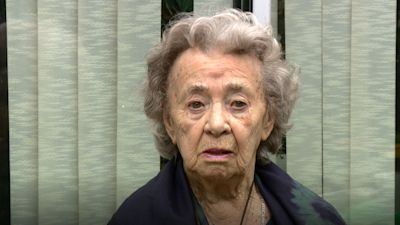‘I do miss company, a lot’ - The devastating impact of lockdown isolation on older people

By ITV Wales journalist Hamish Auskerry
Megan Rolland has had a full and interesting life.
She was a teenager in the last world war, working in the film industry, and she has worked in hospitals and travelled the world.
Her job centred around getting hold of films and arranging which cinemas they would be shown in and when.
That made Megan very popular with the American soldiers based in Cardiff, who wanted her to get hold of the latest movies.
“I had a lot of boyfriends at that time!”, Megan explained. “The soldiers would all be very nice to me, as well as bribing my boss with cigars and chocolate, in order to try and make me give them the best films.
“I soon realised they weren’t at all interested in me, they just wanted the movies!”
At 94 years old, Megan still talks with clarity and humour about her younger days.
She talks about growing up in the Rhondda, moving to the big city and being proposed to by her husband via telephone while he was serving as an officer in Burma.
She also talks about loneliness.
Throughout the coronavirus lockdown, it has been a constant in her life.
Every day is the same. Weeks and months of isolation have drifted by with little in the way of human contact or mental stimulation.
“I do miss company, a lot”, she told me. “After you go I will see Elizabeth for half an hour this evening and then I won’t see anyone. No one”.
I met Megan through an older people's befriending charity called Independent Age. They put me through a DBS check, introduced me to Megan and I was left to develop a great friendship with her.
I used to visit her at home once a week, but since lockdown I have been calling her a bit more regularly for a chat. I get as much out of it as she does - a good laugh and hearing some really great stories from her life.
Her daughter, Elizabeth, has been visiting her every day in lockdown to deliver meals and any medication she needs. But the strict coronavirus rules have necessitated brief, functional visits.
Megan is also almost completely blind, through a condition called Macular Degeneration. Although she is fit-and-healthy enough to walk short distances, it is not safe for her to do that outside her home and garden without someone holding her arm.
That has not been possible with social distancing, so until recently, she has not been anywhere apart from health appointments for five months.
The monotony of lockdown has been a lot to bear.
“By the time I have felt my way around the place, the afternoon is here. And then it’s the evening and then it’s time to go back to bed. It’s the same every day.
“I can’t see to read, I can’t see to write. I can use the telephone, thank god. But that’s about it”.
“It sounds lonely”, I say to her. “It is”, she replies.
“It is lonely but I don’t think about it. I can’t otherwise I’d go potty. I just have to get on with it”.
Loneliness is a problem that does not just affect older people, and anyone can experience it at any point in their life.
In February, the Welsh Government said it had made dealing with the causes of loneliness a priority.
The pandemic has necessitated the diversion of resources and political effort, but loneliness is still a factor across the country for many people.
The charity MIND says feelings of loneliness have worsened the mental health of nearly two in three adults in Wales and over three in four young people.
A Welsh Government spokesperson said: "We are committed to creating an age-friendly Wales that promotes and protects the rights of older people.
“Throughout the pandemic we have engaged with older people and their representatives to understand the impact of COVID-19 on their lives and communities”.
This week, the Older People’s Commissioner for Wales expressed concerns that loneliness and isolation amongst older people has been exacerbated by the pandemic.
Megan and her future husband grew up together in the very tight-knit community of the Rhondda, near Tonypandy. They were boyfriend and girlfriend when he went to Burma as part of the forces.
She did not see him for more than three years while he was at war there.
He died in 1971, nearly 40 years ago, and Megan has lived alone ever since her children left home some years later.
Megan says the isolation of lockdown has made the last few months harder to cope with than even the Second World War.
“Although the war was bad, we knew who and what the enemy was and now we don’t. This virus could be there, it could be anywhere”, she explains.